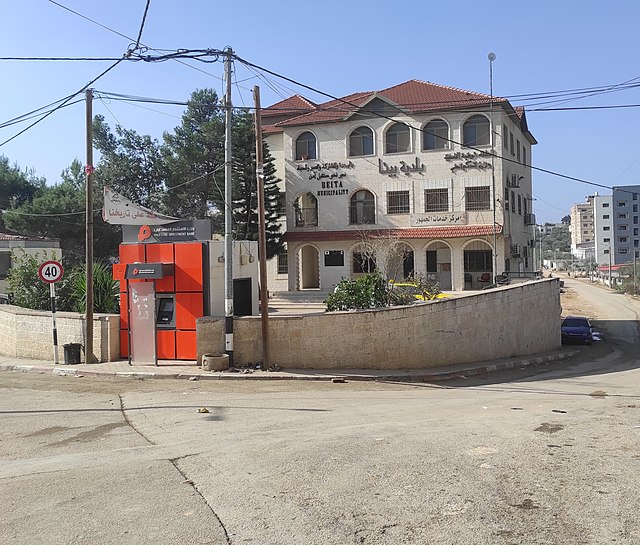Death as a Paradigm
Blog Post by Mark Gold
On Friday September 6, a Turkish born American, Aysenur Ezgi Eygi was shot and killed by an Israeli sniper while protesting against the Occupation in the West Bank town of Beita near Nablus. Eygi, a human rights activist, had arrived in the West Bank to join in non-violent demonstrations against illegal settlements. On Friday, Israeli and Palestinians gathered to protest the hilltop post of Evyatar. Established illegally in 2013 by militants of the Nachala Movement, Israeli security forces evacuated and destroyed the compound several times, but after each occasion, settlers returned and were not prevented from rebuilding. Nightly protests against the illegal settlement have been held for years, with a larger protest conducted every Friday, typically involving many hundreds of people. In May 2021, settlers reoccupied the site and the following month, a Palestinian protester was shot and killed. The settlement is built partially on private Palestinian property; additionally, Palestinian farmers have been denied access to hundreds of hectares of adjacent land. In July 2021, Evyatar was evacuated under an agreement with the new Bennett administration, which permitted the structures to remain while its status was studied. Later that year, a yeshiva was allowed to move to Evyatar, providing a cover for settler return. In June of this year, the Netanyahu government acted to legalize the settlement along with four others.
The Friday protests typically begin with a prayer service after which some of the protesters march toward the outpost which often brings clashes between stone throwing demonstrators and soldiers firing rubber bullets and tear gas. To suppress the demonstrations, the military closed the entrance to Beita for a month and a half and dug up agricultural roads in the rough terrain leading to the protest site, destroying many hundreds of trees. To increase pressure, roughly 150 Beita resident work permits have been canceled and Israeli supporters have been arrested on trumped up charges.
The protest on September 6 began according to the usual pattern. After prayers, demonstrators moved out toward the settlement and clashed with soldiers. Eygi and the group she was with moved away. Later, during a period of quiet, an Israeli eyewitness saw two soldiers on the rooftop of a house roughly an eighth of a mile away from Eygi take aim and shoot. Eygi fell with a bullet to the head while a nearby teen was wounded.
What made September 6th tragedy unusual was not the death, but that it was an American who died. More than half a dozen Beita residents have been killed and about 180 wounded over the last several years. The area south of Nablus is spotted with hilltop settlements, often begun illegally, and typically established through the confiscation of local village, or privately owned land. These include Itamar, Yitzhar, Kfar Tapuach, Rechilim, Givat Harel, Shiloh, Shvut Rahel, Ma’aleh Levona, Migdalim, Neve Shir, Neot Khen, Amichai and Adei Ad, Neve Shoham, the recently “legalized” settlements of Nof Harim, Hayovel, and Palgei Mayim. The string of settlements, running from west to east, is designed to separate Arab population centers of the northern part of the West Bank from population centers in the southern part, below Jerusalem. Further aggravating land issues, the IDF refuses to permit Palestinian farmers access to property close to settler outposts. Shootings of Palestinian farmers working property near settlements are a regular occurrence.
These events have accelerated since the election of the latest and most extreme Netanyahu government. The infamous settler pogrom that occurred in February 2023 at the West Bank town of Huwara was but a short distance from Evyatar. Last year within one week in July, over 85 settler attacks against West Bank Palestinians were recorded. As violence increased, senior Army officers warned of a deteriorating security situation. It was to protect these settlers that the IDF, in 2023, relocated soldiers, leaving the Gaza border unguarded.
Itamar ben Gvir, Israel’s extremist Security Minister, has accelerated West Bank displacements since the Gaza War began, often through the use of settler violence. The independent, non-profit, Armed Conflict Location and Event Data (ACLED) has gathered data on violent events in the West Bank since 2016. Incidents of settler violence against Palestinians doubled in the last quarter of 2023 from the previous quarter, running at roughly 5 times the level of incidents in the second quarter of 2020. Coincident with the extensive distribution of guns to settlers after October 7, the last quarter of 2023 saw a seven-fold jump in settler gun violence from the previous quarter. Displacement activity has been particularly intense in the South Hebron Hills. The UN Office for the Coordination of Humanitarian Affairs reported between October 7, 2023 and the end of January 2024, almost 200 Palestinian families, nearly 1200 people, had been expelled from their homes by settler violence and army restrictions.
Between October 2023 and July 2024, 553 Palestinians had been killed in the West Bank by settlers and the IDF. The Israeli Army radio reported 340 settler attacks in the first half of 2024.
The extremist Netanyahu regime sees accelerated West Bank settlement through violence as a kind of victory. In July, General Yehuda Fox, the outgoing head of Israel’s central command, condemned West Bank settler violence, calling it “nationalist crime,” which “sowed chaos and fear in Palestinian residents who do not pose a threat.”
These acts of violence are a moral failing. They are also a security failing, fomenting hatred, and increasing international isolation, alienating not only Israel’s international allies but increasingly, Diaspora Jewish communities and particularly Jewish youth.
In place of this toxic mix of religious messianism and chauvinism, a different vision for Israel must be projected: one of peace, mutual security, and cooperation which can be the foundation for a creative future for both Jews and Palestinians, each realizing self determination in their own respective states.
Mark Gold is the Board Treasurer of Partners for Progressive Israel






Leave A Comment